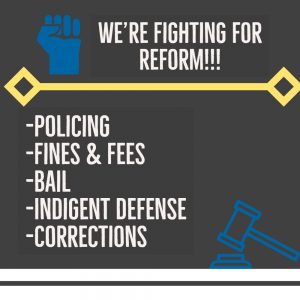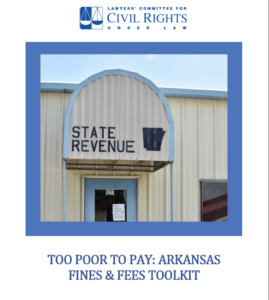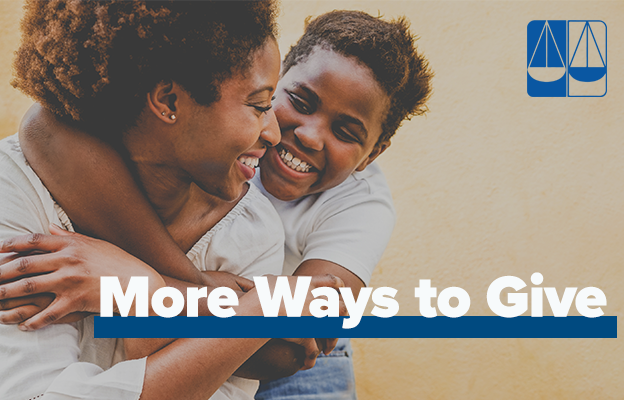Criminal Justice
 The Lawyers’ Committee for Civil Rights Under Law established its Criminal Justice Project (CJP) to challenge racial disparities within the criminal justice system that result from the criminalization of poverty and contribute to mass incarceration. People of color and the poor face unequal justice when law enforcement and court operations prioritize revenue-generation over public safety. Local jails are being filled by the repeated arrest of individuals who cannot afford to pay court-imposed fines and fees associated with misdemeanors and other low-level poverty-related offenses, like writing hot checks, driving without a license, and having expired insurance. Some jurisdictions even address juvenile status offenses like truancy and curfew violations with heavy fines and fees. Compounding these issues is the rapid expansion of community corrections, which subjects 4.5 million people to the perpetual threat of incarceration as the result of probation and parole violations, including non-payment of fines and fees.
The Lawyers’ Committee for Civil Rights Under Law established its Criminal Justice Project (CJP) to challenge racial disparities within the criminal justice system that result from the criminalization of poverty and contribute to mass incarceration. People of color and the poor face unequal justice when law enforcement and court operations prioritize revenue-generation over public safety. Local jails are being filled by the repeated arrest of individuals who cannot afford to pay court-imposed fines and fees associated with misdemeanors and other low-level poverty-related offenses, like writing hot checks, driving without a license, and having expired insurance. Some jurisdictions even address juvenile status offenses like truancy and curfew violations with heavy fines and fees. Compounding these issues is the rapid expansion of community corrections, which subjects 4.5 million people to the perpetual threat of incarceration as the result of probation and parole violations, including non-payment of fines and fees.
Likewise, people of color and the poor disproportionately face the threat of incarceration as the result of pretrial practices that rely on “money bail” and formulaic rather than individualized bail determinations. These practices are particularly harmful when jurisdictions fail to provide individuals with the effective assistance of counsel guaranteed by the Sixth Amendment. Because these inequalities are rampant within the American criminal justice system, mass incarceration—a major promotor of economic inequality—has exploded.
Any questions? Contact the Criminal Justice Project at: CJHotline@lawyerscommittee.org or 1-866-996-7921
Our Most Recent Work:
While the nation was poised for the passage of the Marijuana Opportunity Reinvestment and Expungement (MORE) Act in the House of Representatives last month, the vote has been delayed until after the election, making it essential that state-level cannabis reform efforts continue. The Lawyers’ Committee for Civil Rights Under Law released the Post-Cannabis Conviction Toolkit, which attorneys and advocates can use to determine if their state allows expungement. Black Americans and other marginalized communities have also been disproportionately negatively impacted by the War on Drugs, and the toolkit includes an overview of the three main approaches state can take to repair the social, political, and economic damage inflicted on these communities related to marijuana. Read the full story about the toolkit here.
On Sept. 29, Arthur Ago, director of the Criminal Justice Project, testified before the U.S. House Subcommittee on Oversight and Investigations. The hearing, “Police Cameras at the Department of the Interior: Inconsistencies, Failures and Consequences,” focused on the lack of transparency and accountability from the Department of Interior police forces and how this can best be addressed. During his testimony, Ago presented five main points:
- The Department of Interior police forces have to be more accountable and transparent to the public, and a good first-step would be requiring body-worn and dashboard cameras.
- Body-worn and dashboard cameras must be accompanied by robust rules and policies that govern how police forces use the cameras, maintain the recordings and make the recordings public in cases alleging police misconduct. These rules must also discipline the police officers who fail to obey orders around body-worn and dashboard camera use.
- There must also be limitations on how cameras are used. They must not be used discriminatorily against people of color and those demonstrating against police misconduct and violence.
- The U.S. Park Police, one of Interior’s forces, has been a woeful failure in accountability and transparency. The Park Police are a case study in secrecy and impunity.
- Congress has a real opportunity to lead these police forces toward increased accountability and transparency, and in the process, these police forces can lead needed fundamental change across all federal police forces.
Read Ago’s full testimony here.
Fines and Fees
In March 2019, the Criminal Justice Project of the Lawyers’ Committee for Civil Rights Under Law produced its report, “Too Poor to Pay: How Arkansas’s Offender-Funded Justice System Fuels Mass Incarceration.
Washington County
- Petition
- Press Release
- Media Coverage (AP News)
- Media Coverage (Tulsa World)
- Media Coverage (Public Radio Tulsa)
Mahoney v. Derrick – Indigent Incarceration Fines, Fees, and Bail:
Dade v. Sherwood (2016) Indigent Incarceration – Fines and Fees
Cain v. City of New Orleans (2015) Indigent Incarceration – Fines and Fees
- Motion for class cert.
- Complaint
- Media Coverage (NY TImes)
- Media Coverage (The Advocate)
- Media Coverage (Mother Jones)
- Media Coverage (NPR)
- Media Coverage (The Advocate)
Justice Network v. Craighead County, et al.
- Press Release November 29, 2017
- Press Release August 24, 2017
- Amicus Brief
- Media Coverage
Pre-Trial & Bail Reform
Alice Hughes v. 4 Aces Bail Bonds Inc (2018)
- Press Release
- Filing
- Media Coverage (Baltimore Sun)
- Media Coverage (WMAR Baltimore)
- Media Coverage (The Daily Record)
O’Donnell v. Harris County, et al.
- Press Release August 10, 2017
- Amicus Brief
Policing
Dialogue on Race & Policing: Community-based project convenes local government, academic, civil rights, and law enforcement leaders for facilitated conversations on the historical and modern-day interplay of race and policing, followed by a working-session to develop recommended actions for improving trust and accountability between police and community residents.
- Launch announcement
- Media Coverage (The Advocate)
- Media Coverage (The Advocate)
- Media Coverage (The Advocate)
Law Enforcement Data
P.R.O.T.E.C.T. Joint initiative with the National Black Law Students Association launched in response to #LivingWhileBlack complaints, which led to police use-of-force incidents on college and university campuses involving black students and students with mental illness
Indigent Defense/ Right To Counsel
Public Education
Tips for Counter Protesters and Law Enforcement
 Baltimore Consumer Bail Project – Provides direct representation for individuals being sued by bail bond companies, with a particular focus on those who have had body attachments issued against them and face incarceration due to inability to pay the attachment amounts.
Baltimore Consumer Bail Project – Provides direct representation for individuals being sued by bail bond companies, with a particular focus on those who have had body attachments issued against them and face incarceration due to inability to pay the attachment amounts.
Featured Issues
PROSECUTION REFORM
CORRECTIONS



